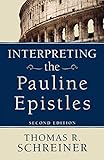Interpreting the Pauline Epistles / Thomas R. Schreiner.
Material type: TextPublication details: Grand Rapids, Mich. : Baker Academic, c2011.Edition: 2nd edDescription: xv, 166 p. : ill. ; 22 cmISBN:
TextPublication details: Grand Rapids, Mich. : Baker Academic, c2011.Edition: 2nd edDescription: xv, 166 p. : ill. ; 22 cmISBN: - 9780801038129 (pbk. : alk. paper)
- 080103812X (pbk. : alk. paper)
- 227/.0601 22
- BS 2650.52 .S36 2011
| Current library | Collection | Call number | Vol info | Status | Date due | Barcode |
|---|---|---|---|---|---|---|
| Judith Thomas Library General Stacks | BKS | BS 2650.52 .S36 2011 (Browse shelf(Opens below)) | AUA013409 | Available | AUA013409 |
Originally published: Grand Rapids, Mich. : Baker Book House, c1990, in series: Guides to New Testament exegesis ; 5.
Includes bibliographical references.
Understanding the nature of letters -- Doing textual criticism -- Translating and analyzing the letter -- Investigating historical and introductory issues -- Diagramming and conducting a grammatical analysis -- Tracing the argument -- Doing lexical studies -- Probing the theological context -- Delineating the significance of Paul's letters -- Conclusion -- Select commentaries on the Pauline Epistles.
Thomas Schreiner provides an updated guide to the exegesis of the New Testament epistles traditionally assigned to Paul. The book helps readers understand the nature of first-century letters, do textual criticism, investigate historical and introductory issues, probe theological context, and more. --from publisher description
